高考复习情态动词[上学期]
图片预览

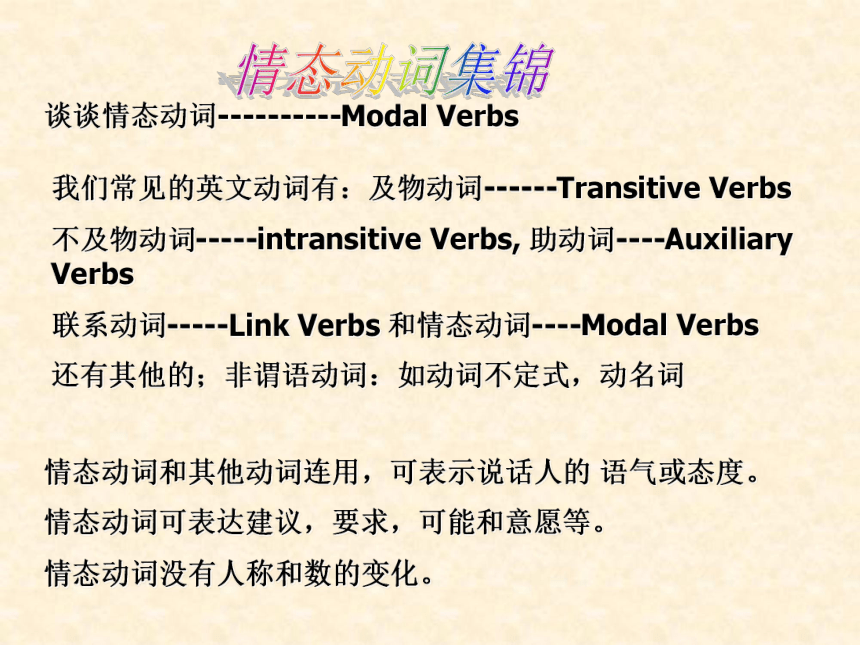

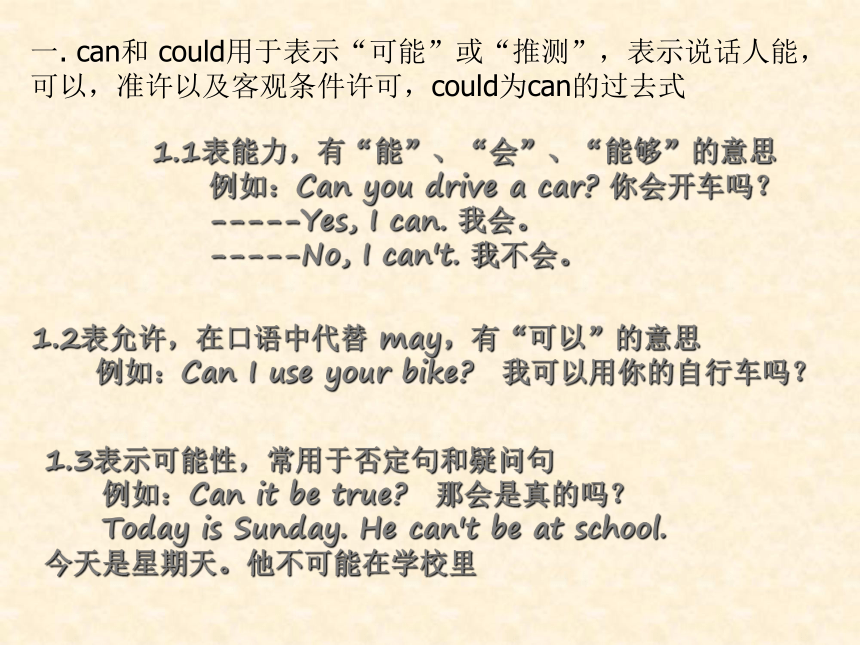

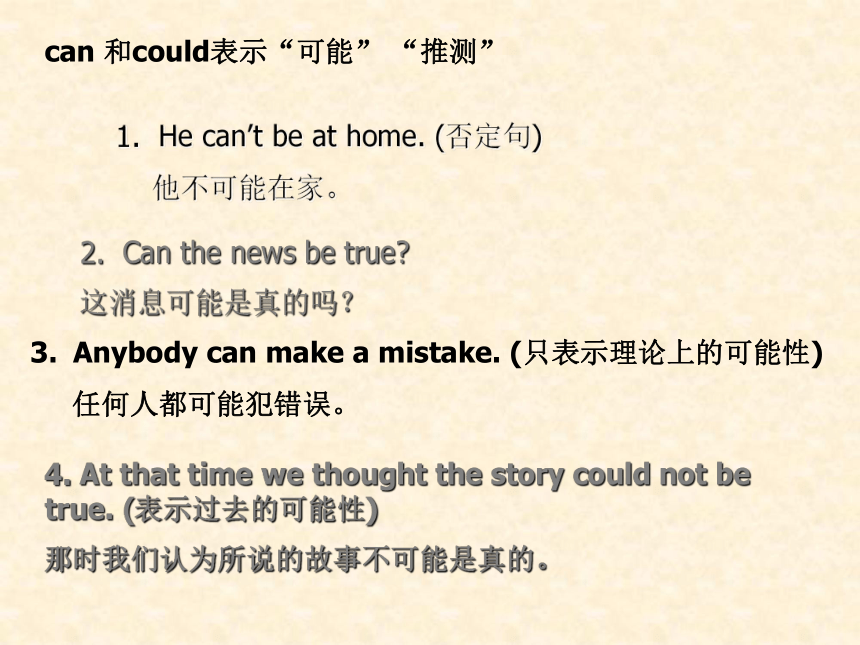
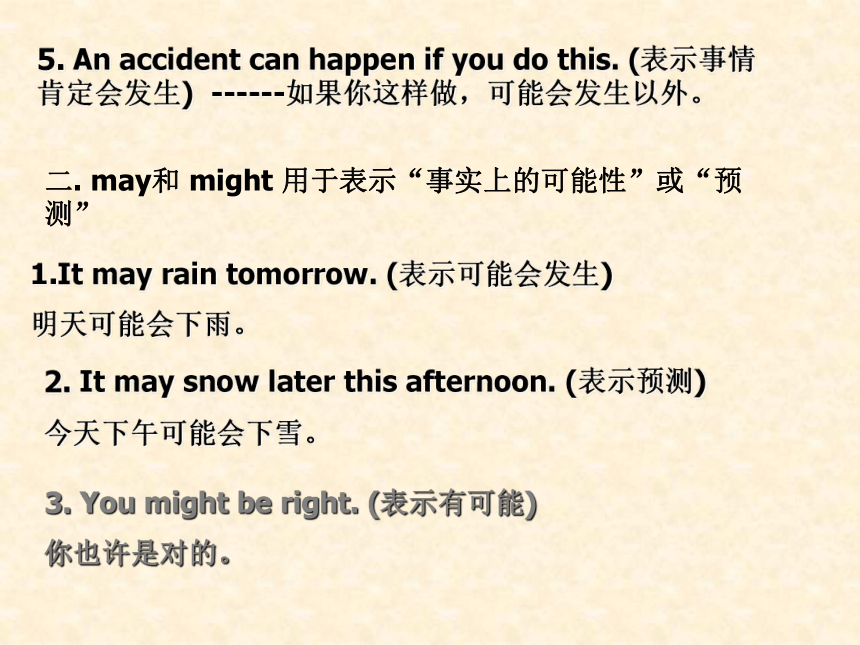
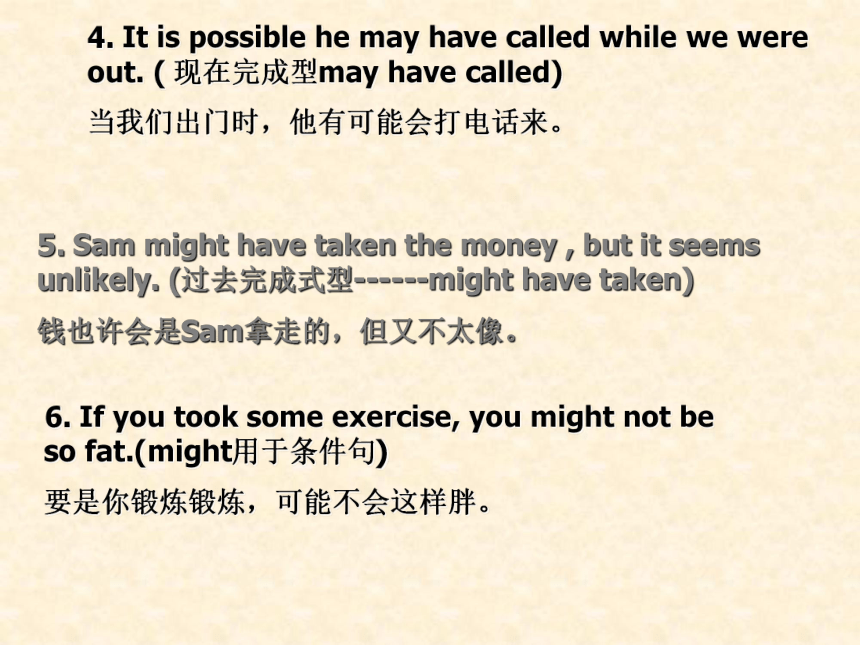
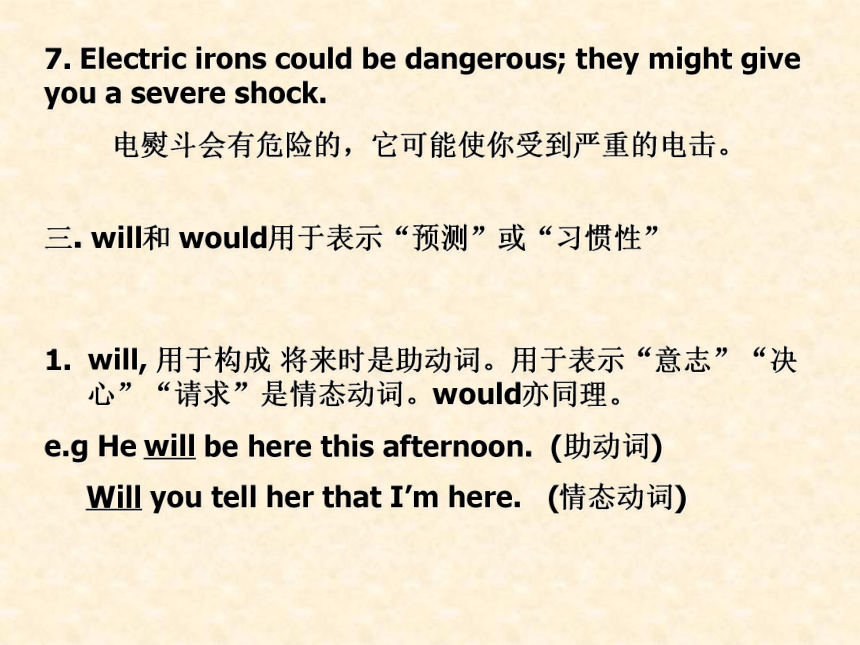
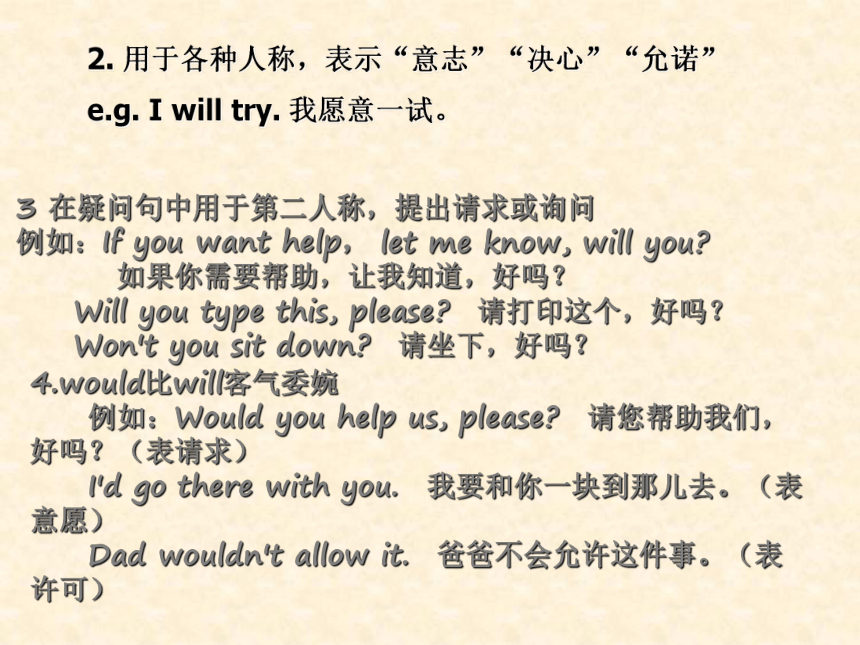
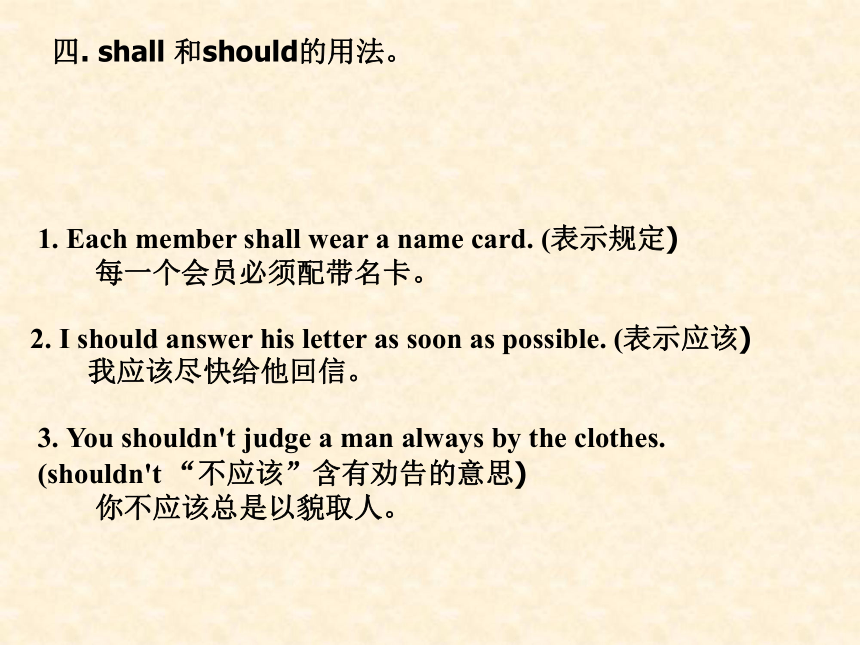
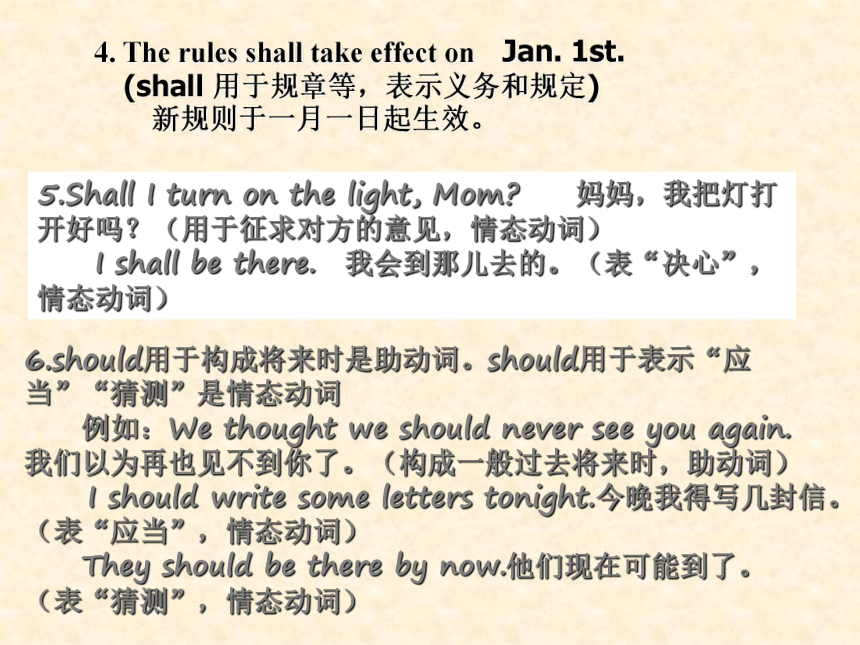
文档简介
课件81张PPT。高考复习情态动词
谈谈情态动词----------Modal Verbs我们常见的英文动词有:及物动词------Transitive Verbs
不及物动词-----intransitive Verbs, 助动词----Auxiliary Verbs
联系动词-----Link Verbs 和情态动词----Modal Verbs
还有其他的;非谓语动词:如动词不定式,动名词情态动词和其他动词连用,可表示说话人的 语气或态度。
情态动词可表达建议,要求,可能和意愿等。
情态动词没有人称和数的变化。情态动词集锦常见的情态动词有: can 能 may 可以 will,would (表意愿) need 需要 dare 敢 must 必须 have to 不得不 shall,should 应该(表义务) ought to 应该情态动词的定义: 情态动词是一种本身有一定的词义,表示说话人的情绪,态度或语气的动词,但不能单独作谓语, 只能和其他动词原形构成谓语。 一. can和 could用于表示“可能”或“推测”,表示说话人能,可以,准许以及客观条件许可,could为can的过去式1.1表能力,有“能”、“会”、“能够”的意思 例如:Can you drive a car? 你会开车吗? -----Yes, I can. 我会。 -----No, I can't. 我不会。 1.2表允许,在口语中代替 may,有“可以”的意思 例如:Can I use your bike? 我可以用你的自行车吗? 1.3表示可能性,常用于否定句和疑问句 例如:Can it be true? 那会是真的吗? Today is Sunday. He can't be at school.
今天是星期天。他不可能在学校里 1.4过去式could表示的语气更加委婉、客气 例如:Could I come to see you tomorrow? 明天我可以来见你吗? 1.5 can 和 be able to 的比较 1) can 只有一般现在时和一般过去时两种时态(could),其他时态要用be able to的形式
例如:I haven‘t been able to get in touch with her. 我一直没能和她联系上。 2) 通常can 和 be able to 可以互换 例如:He will come if he can.
如果可能的话,他一定会来。 can 和could表示“可能” “推测”He can’t be at home. (否定句)
他不可能在家。Can the news be true?
这消息可能是真的吗?Anybody can make a mistake. (只表示理论上的可能性)
任何人都可能犯错误。4. At that time we thought the story could not be true. (表示过去的可能性)
那时我们认为所说的故事不可能是真的。5. An accident can happen if you do this. (表示事情肯定会发生) ------如果你这样做,可能会发生以外。二. may和 might 用于表示“事实上的可能性”或“预测”1.It may rain tomorrow. (表示可能会发生)
明天可能会下雨。2. It may snow later this afternoon. (表示预测)
今天下午可能会下雪。 3. You might be right. (表示有可能)
你也许是对的。4. It is possible he may have called while we were out. ( 现在完成型may have called)
当我们出门时,他有可能会打电话来。5. Sam might have taken the money , but it seems unlikely. (过去完成式型------might have taken)
钱也许会是Sam拿走的,但又不太像。6. If you took some exercise, you might not be so fat.(might用于条件句)
要是你锻炼锻炼,可能不会这样胖。7. Electric irons could be dangerous; they might give you a severe shock.
电熨斗会有危险的,它可能使你受到严重的电击。三. will和 would用于表示“预测”或“习惯性”will, 用于构成 将来时是助动词。用于表示“意志”“决心”“请求”是情态动词。would亦同理。
e.g He will be here this afternoon. (助动词)
Will you tell her that I’m here. (情态动词)2. 用于各种人称,表示“意志”“决心”“允诺”
e.g. I will try. 我愿意一试。3 在疑问句中用于第二人称,提出请求或询问 例如:If you want help, let me know, will you?
如果你需要帮助,让我知道,好吗? Will you type this, please? 请打印这个,好吗? Won't you sit down? 请坐下,好吗? 4.would比will客气委婉 例如:Would you help us, please? 请您帮助我们,好吗?(表请求) I'd go there with you. 我要和你一块到那儿去。(表意愿) Dad wouldn't allow it. 爸爸不会允许这件事。(表许可) 四. shall 和should的用法。1. Each member shall wear a name card. (表示规定) 每一个会员必须配带名卡。 2. I should answer his letter as soon as possible. (表示应该) 我应该尽快给他回信。3. You shouldn't judge a man always by the clothes. (shouldn't “不应该”含有劝告的意思) 你不应该总是以貌取人。 4. The rules shall take effect on Jan. 1st.
(shall 用于规章等,表示义务和规定) 新规则于一月一日起生效。5.Shall I turn on the light, Mom? 妈妈,我把灯打开好吗?(用于征求对方的意见,情态动词) I shall be there. 我会到那儿去的。(表“决心”,情态动词) 6.should用于构成将来时是助动词。should用于表示“应当”“猜测”是情态动词 例如:We thought we should never see you again. 我们以为再也见不到你了。(构成一般过去将来时,助动词) I should write some letters tonight.今晚我得写几封信。(表“应当”,情态动词) They should be there by now.他们现在可能到了。 (表“猜测”,情态动词) 五. must用于表示“必定”“必须”
1.?must表示必须,否定回答时用needn’t.
?mustn’t表示不许可
e.g.1) Must I come tonight? ------No, you needn’t.
2) You mustn't’t smoke in the hospital.2?.must用于肯定句,可以表示推测,翻译为:一定或想必。后面接动词的一般时,表示对现在的推测,接动词的完成式,表示对过去的推测。对过去的推测是考试的重点 1) She?must?live?near?here,?for?she?comes?to?work?on?foot. 2)She?was?absent?from?class.?There?must?have?been? something?wrong?with?her. 3)The?light?was?out.?They?must?have?gone?to?bed. must用法的例子This must be good for you. (must be 肯定)
这肯定对你是有益的。2)All animals must die. (表示必然会发生的事情)
所有的人一定会死。3) Mustn‘t there be a mistake? (mustn’t多用于疑问句)
那肯定会有错误吗?六. ought to 用于表示“想必会” 语气比must弱They ought to be there by now.
他们想必已经到那儿了。2. He ought to stop smoking.
他最好不要抽烟了。情态动词的用法:表示:“许可”“请求”一. can和 could用于表示“许可”“请求”Can I go with you? ( 请求)
我能跟你一起走吗?2. Father said I could go to the cinema. (过去的许可)
爸爸说我可以去看电影。3. Could I ask you something? (请求,用could比can更婉转)
我可以问你一件事情吗?4. You can come in . (表示允许,常见于口语中)
你可以进来。5. You can’t smoke in the meeting room. (can’t 表示“禁止”)
会议室里不准吸烟。6. Can’t you do it now? (表示反问)
你不能现在做吗?二. will和would 表示“请求”Will you kindly tell me the way to the post office? (表示客气请求)
请问邮局怎么走?2. Would you give me your address? (用would比will更客气。)
请你告诉我你的地址,好吗?情态动词表示“推测”的用法。1.情态动词表示“推测”的用法 情态动词表示“推测”时,要记住以下两种推测和形式 推测: ①对过去发生动作或状态的推测; ②对现在状态的推测。 两种形式:①用情态动词加完成时态表示对过去发生动作或状态的推测; ②用情态动词加动词原型表示对现在发生动作或状态的推测。 具体用法如下:9.1 must have done表示过去一定做了什么,语气十分肯定 例如:You must have finished your work.
你一定完成了你的工作。
9.2 can’t have done表示过去不可能做了什么,语气也比较肯定(是上面的否定形式) 例如:He can’t have gone to Beijing, for I had a talk with him just now.
他不可能去过北京,因为我刚和他交谈过。 9.3 needn’t have done表示过去没有必要做什么但已经做了。 例如:You needn’t have come earlier. 你不需要来这么早的。 9.4 should have done过去该做什么但没有做。(含有责备的意思)。 例如:You should have started earlier.你本应该早点开始的。 9.5 shouldn’t have done表示过去不该做什么但做了。(含有责备的意思) 例如:You shouldn’t have helped him, he could
do it himself.你本不该帮助他的,他能自己做。
9.6 ought to have done表示过去该做什么而没有做。(是职责和义务) 例如:You ought to have helped him. (but you didn’t.)你应该帮助他的。 9.7 can/could do sth.表示对现在情况的猜测,常用于否定句、疑问句或感叹句中。 例如:This news can’t be true. 这消息不可能是真的。 9.8 may/might do sth. 表示对现在情况的猜测,常用于肯定句中。 例如:Mr.Wang may know Professor Li’s telephone number.王先生也许知道李教授的电话号码。 1. It?was?very?kind?of?you?to?do?the?washing-up,?but?you?____it. A)?mustn’t?have?done? B)?would?not?have?done C)?might?not?have?done? D)?didn’t?have?to Exercises!2.You?____?all?those?calculations!?We?have?a?computer?to?do?that?sort?of?thing. A)?needn’t?have?done? B)?must?not?have?done C)?shouldn’t?have?done? D)?can?not?have?done 3.Mary’s?score?on?the?test?is?the?highest?in?her?class.?She?____?have?studied?very?hard. A)?may? B)?should?
C)?must? D)?ought?to? 4.This?box?is?too?heavy,?____give?me?a?hand?? A)?would?you?mind? B)?would?you?please C)?will?you?like?to? D)?will?you?please?to? Exercises!情态动词表示说话人对动作或状态的各种观点和态度,如需要、猜测、意愿或怀疑等。情态动词有词义,但不完全,是所谓的“辅助性”动词,在句中不能单独充当谓语。
一、表示许可 may, might, can, could
在口语中可用can,could代替may,但在正式场合用may。表示允许时,也可用might代替,might不表示过去时,而是表示口气比较婉转。 May/Can/Could/Might I have a talk with you? 我可以和你谈谈吗? -Could I use your dictionary? 我可以用一下你的字典吗? -Yes, go ahead.可以,用吧。????
(或Yes, you can.但不能说Yes, you could.)
☆ May I ...? 问句常见的肯定回答和否定回答: 肯定回答 否定回答
Certainly. No, you mustn't.(具有强烈禁止的意思)
Yes, please. No, you can't.(最常见)
Yes, of course. Please don't./You'd better not.
Sure. I don't think you can.
Go ahead, please. I'm sorry it's not allowed.二、表请求 may, might, will, would
-May/Might I come into the room to see my mother? 我可以进房间看我母亲吗? -No, you mustn't. She needs to have a good rest. 不,你不能进。她需要好好休息。
will和would可用于第二人称疑问句,表示请求和建议等。would比will委婉客气。 Will you share your happiness with us? 你可以把你的欢乐与我们共享吗? ☆ Will/Would you ...? 表示请求和建议的答复: 肯定回答 否定回答
Yes, please. 是的,请。 I'm sorry. I can't. 对不起,不行。
Certainly. 当然可以。 No, thank you. 不,谢谢。
Sure. 当然了。 No, I won't. 不,不行。
All right. 好啊!三、表能力 can, could
表示能力,可译为“能,会”。 The cinema can seat 1,000 people. 这电影院能容纳1000人。 I could not read such an easy book when I was 7 years old. 我七岁时连如此简单的书也看不懂。 ☆ can与be able to的区别 ①can表示“能力”时,和be able to相当,许多场合都可以互相替换。但当叙述过去经过一番努力才能完成的事情或前面有特殊说明,表示你有能力时,只能用be able to。 【误】The fire spread the building quickly but everybody could escape. 【正】The fire spread the building quickly but everybody was able to escape. ②be able to比can有更多形式。 When he grows up, he will be able to support his family. ③could经常和动词see, hear, smell, taste, feel, remember, understand等连用。
When we went into the house, we could smell something burning. ④在谈论说话时发生的动作,用can,不用be able to。 【误】Look! I'm able to swim. 【正】Look! I can swim. 四、表示习惯 will, would, used to
will和would可表示某种倾向或习惯性动作。will表示现在的习惯动作,would表示过去的习惯动作。used to表示过去的习惯或过去某时期的状况,但现在已不存在。
He will surf the Internet every night.
He would be nervous when he met strangers.
He used to drink tea but now he drinks coffee. He is not what he used to be. ☆ would和used to的用法比较。 ①used to表示过去与现在或过去某时与后来的情况有不同,强调“现已无此习惯了”,而would只表示过去的情况,与现在无关。 ②used to可表示过去的习惯动作或状态,而would只表示过去的习惯动作。
③used to可泛指过去的习惯性动作或状态,而would表示过去的习惯性动作时,往往要带有一个特定的时间状语。
【误】We would play hide-and-seek in the fields. 【正】We used to play hide-and-seek in the fields. 【正】Whenever we were in the country, we would play hide-and-seek in the fields. 五、表示意愿 will, would, shall
☆ will和would可表示意志、愿望和决心,用于各种人称陈述句。 I will do anything for you. None is so blind as those who won‘t see. They would not let him in because he was poorly dressed.
☆ shall表示说话人的意愿,有“命令、允诺、警告、决心”等意思,用于第二、三人称陈述句中。 You shall do as I say. 按我说的做。???? (命令) Nothing shall stop us from carrying out the plan. 什么也阻止不了我们执行这项计划。???? (决心) He shall have the book when I finish reading. 我看完这本书就给他看。???? (允诺)
You shall fall behind in your exam if you keep playing. 如果你一直玩,你就会在考试中落后。???? (警告) 六、表义务 must, have to, should, ought to
1.must表示有做某一动作的必要或义务,强调主观看法,可译为“必须,应该”。 Everyone must obey the rule. Teachers must be patient enough with their students.
2.have to表示因客观需要促使主语不得不做某事。
You can't turn right here. You have to turn left.
3.must与have to的比较。
①must含有说话者的强烈决心(表示主观的看法),have to则表示外力环境或习惯使然(即表示客观的必要,作“不得不”解)。 I must study hard. 我必须努力学习。 (发自内心的决定) I have to study hard.我不得不努力学习。 (外界因素逼迫)
②must只有一种形式,而have to可有多种时态。 They had to put off the sports meet due to the bad weather. ③must的否定式和have to的否定式的意思完全不同。 You must keep it a secret. You mustn't tell anyone. You don't have to tell me the secret.
(mustn‘t表示“禁止”)
(don't have to意思是"没有必要"= don't need to)4.Should 表示义务,意为"应该"(某件事宜于做),用于各种人称。 One shouldn't be selfish. Children should obey their parents.
5.Ought to表示义务,意为“应该”(因责任、义务而该做),口气比should稍重。
We ought to defend our country. 6.ought to与should的比较。 ought to和should的含义较近,但不完全相同。ought to表示“应该”,是从“义务”或“按理推断”的角度来讲的。Should则是从说话人的个人看法这一角度来讲的。 You are her mother. You ought to look after her. (是道义上的责任,不能和should互换。)
Children should be seen, not heard. 对孩子要观其行,不要听其言。
提 示 表示“义务”时,我们在口语中可以用be supposed to来代替should和ought to。 I'm supposed to be there at 8:00. 我应该八点到那里。七、表猜测 must, may, might, can, could, should, ought to
1. 适用范围和可能性的大小
must表示推测时,它的肯定程度比may,might,could大得多,一般只用于肯定句。
may, might表示推测,一般只用于肯定句。可译为“可能,也许”。(一般情况下,might表示的可能性很小) can和could表示推测,可用于肯定句(can罕见)、否定句和疑问句,但更常见于疑问句或否定句。在此种用法中can和could没有时态的区别,只是表示可能性的大小,can表示推测的可能性比could大。
should表示对过去、现在或将来情况的某种推测,可译为“可能、照说应该”。 一般用于肯定句,可指人的直觉或个人看法。
It should be fine tomorrow.
ought to表示推测,暗含很大的可能,可译为“应该是,会是”。
一般用于肯定句,可指人的直觉或个人看法。
Prices ought to come down soon. 2. 猜测用法中时态的表示
情态动词 + do (这里的do通常是状态动词或系动词),表示对现在状态的推测。
Carol must get very bored with her job. She does the same thing every day. He's just had his lunch. He can't be hungry.
情态动词 + be doing表示对现在动作或状态的推测。
Put on more clothes. You must be feeling cold with only a shirt on. 情态动词 + have done表示对过去的动作或状态的推测。
Leslie walked past me without speaking. He can‘t/couldn’t have seen me.
八、部分情态动词的固定搭配
Can和 could 的一些固定搭配
1.Can’t/couldn’t help doing 忍不住;不禁、、、
He can’t help laughing.
2.Can’t/couldn’t but + 动词原形 只好、、、;不得不、、、
I couldn’t but admit that he was right and I was wrong.
我不得不承认他对了,我错了。
3.cannot/couldn’t … too + 副词/形容词;
cannot/couldn’t …+副词/形容词 + enough
无论、、、也不过分; 越、、、越好
You can’t be too careful when crossing the street.
I cannot thank you enough. 我对你感激不尽。 may 和might 的某些固定搭配
may well + 动词原形 理应、、、;有足够的理由、、、
We may well say she is a good teacher.
我们大可说她是一位优秀的老师。
2. may/might as well + 动词原形 不妨、、、;还不如、、、
You never listen---- I might as well talk to a brick wall.
你从来不听我的话,我还不如对着一堵墙说话。
3. may…but 或许会、、、但是、、、
She may be beautiful, but she is cool.
她也许算的上美丽,但太冷漠了。
英语口语中dare的几个常用结构:
○I dare say...我想,大概,可能,或许……
I dare say things will improve. 我想情况会好转的。
○How dare you ...? 你怎么敢……?
How dare you ask me such a question? 你怎么敢问我这样的问题?
○I dare you ... 我谅你也不敢……
I dare you to tell your parents! 我谅你也不敢告诉你父母!
九、“情态动词 + have done”是情态动词的一个十分重要的结构,这种结构有两个主要的用法。
☆表示对过去发生动作或状态的推测或估计☆表示对过去发生动作的遗憾或责备(可能是Kate。)(绝对不是Marry。)(可能不是Tommy。)Mum: Who is it?
Jim: (一定是Tom。)It must be Tom.It may be Kate.It can’t be MarryIt couldn’t be Tommy.Modal Verbs (3)mustcan / couldmay / mightWhen you are very sure of something, you use must in positive sentence and cannot or can’t in negative sentences.When you are quite sure about something, you use can.When you think that something is possible, but you are not very sure, you use could, may or might.2. It must have rained last night, _________?It must be nice to take a walk here, __________?must的用法must表示推测时,其反意疑问句应根据动词的实际时态而变化。如: isn’t it didn’t itWe must have been met somewhere before.You must have seen her yesterday, didn’t you?2. Must have done 意为“一定做过”,表示对过去发生的事情进行肯定推测。如:1. 我们以前一定在哪里见过面。2. 你昨天一定看到她了,对不?can / could 的用法can / could表示的可能性比must小,can表现在和将来,could既可表过去,也可表现在或将来,但它的可能性给can的小。
can / could可与not连用,表示否定推测,也可用于疑问句中.
Can / could表推测时,其反间疑句也是根据动词的实际时态国以变化。如:你不可能当真的,对不地?
You can’t be serious, are you?4. can / could have done,意为“本来能够”,用于否定句时,意为“过去(不)可能”,而实际上都未发生。
如: 你本来可以来早点的。You could have come earlier.may/might的用法may / might的可能性最小,往往表示原因说话人对某事没把握
May / might可与not连用,表示否定推测,但may用于疑问句时中能表示请求允许。The teacher may not e serious.May I leave now?3. May / might have done, 表示对过去可能发生某事的推测。
如: 你在做这件事时也许注意到了什么。You may have noticed something while you were doing this.
I am not sure whether he will come or not. He must come tonight.
He mustn’t be an American because he can’t speak English at all.
I tried to call him at the office, but there is no reply. He can be at home.
--- Is John coming by train?
--- He should, but he ____ not. He likes driving his car. (NMET 2002)
a. must b. can c. need d. may
5. A left luggage office is a place where bags ____ be left for a short time, especially at a railway station
a. should b. can c. must d. will6. My English-Chinese dictionary has disappeared. Who ____ have taken it?
a. should b. must c. could d. would
7. My sister met him at the Grand Theater yesterday afternoon, so he ______ lecture.
a. Couldn’t have attended
b. needn’t have attended
c. mustn’t have attended
d. shouldn’t have attended
8. ---- Could I borrow your dictionary?
---- Yes, of course you ____. (NMET1992)
a. might b. will c. can d. should 1.--Is John coming by train?
--He should, but he ____ not. He likes driving
his car. (2002高考题)
A. must B. can C. need D. may
2.It has been announced that candidates(候选人)
____ remain in their seats until all the papers
have been collected. (2002上海高考题)
A. can B.will C. may D. shall
3.--I heard they went skiing in the mountains last
winter. (2002北京高考题)
--It ____ true because there was little snow there.
A. may not be B. won’t be
C. couldn’t be D. mustn’t be 情态动词表示推测不表示推测can could
may might
shall should
must
will would
ought tohave to
dare (daren’t)
need (needn’t)
used toI daren’t ask her for a rise. 我不敢请求她加薪.
How did you dare to tell her that?
I wonder whether he dare stand up in public.
I don’t know how she dares to wear that dress.
Do you need any help?
I wonder whether he need send it immediately.
I need hardly tell you that the work is dangerous.
The garden doesn’t need watering at the moment.
You needn’t finish that work today.可兼做行为动词的情态动词:need 、 dare 情态动词 (+动词原形)行为动词 .needdare 1.无人称和数的变化; 2.尤其用于:*否定句及疑问句中;*在if/whether之后;*或与hardly, never,
no one, nobody连用; 3.常以needn’t 和daren’t
的形式出现;4.dare有其过去时dared. 多用于肯定句;
(sb.) need to do
dare to do
(sth.) need to be
done
(sth.) need doing
判断正误:
How dare you say such a thing?
How dare you to say such a thing?He daren’t to speak English before such a
crowd, did he?
He daren’t speak English before such a
crowd, dare he?Nobody need to be afraid of catching the disease.
Nobody need be afraid of catching the disease.These dishes need be cleaned carefully.
These dishes need to be cleaned carefully.
These dishes need cleaning carefully.注意对need问句的回答:
--Need I finish the work today?
--Yes, ________________.
No, ________________.
No, ________________.you mustyou needn’tyou don’t have toneedn’t 对其它情态动词的回答:
--Shall I tell John about it?
--No, you __________.
--Must we do it now?
--No, you __________.
needn’t
(don’t have to) needn’t
(don’t have to)表示推测——情态动词的重要用法.1. You must be Mr Smith----I was told to expect
you here.
2. He must have known what we wanted.
3. We may have read the same report.
4. He can’t have slept through all that noise.
5. There’s someone outside----who can it be?
6. What can they be doing?
7. These pills might help to cure your disease.
8. You could be right, I suppose.表示推测——情态动词的重要用法.肯定的推测
可能的推测
否定的推测
疑问的推测must 对将来 对现在 对过去情态动词may, might can’t,
couldn’tcan, could + V. + V. + have done
常见must be + be doing + V. + V. + have done
+ be doing
可以用not表示“可能不”
+V. + V. + have done
+ be doing+ V. + V. + have done
+ be doing 1. I don't know where she is, she _______ in
Wuhan.
2. At this moment, our teacher ________________
our exam papers.
这时,我们老师想必在批改试卷。
3. The road is wet. It ________________ last night.
(rain)
4. Your mother ______________________ for you.
你妈妈一定一直在找你。
may bemust be markingmust have rainedmust have been looking5. Philip ________________________ seriously in
the car accident. 菲利普可能在车祸中受了重伤.
6. ---Linda has gone to work, but her bicycle is
still here.
---She _____________________ (go) by bus.
7. Mike ________________ his car, for he came to
work by bus this morning.
迈克一定还没有找回他的车,因为早上他是坐
公共汽车来上班的。
may (might) have been hurtmay (might) have gonecan’t have found高考考题:
1. I thought you _____like something to read, so
I have brought you some books.
A. may B. might C. would D. must
2. Where is my pen? I ____it.
A. might lose B. would have lost
C. should have lost D. must have lost
3. I didn’t hear the phone. I ___asleep
A. must be B. must have been
C. should be D. should have beenB D B 4. ---There were already five people in the car,
but they managed to take me as well.
----It ____a comfortable journey
A. can’t be B. shouldn’t be
C. mustn’t have been D. couldn’t have been
5. It’s nearly seven o’clock . Jack ___be here at
any moment.
A. must B. need C. should D. could
D D 请把下列词语组合成句:1. ___________________________________,
( play, interesting, must, be, new, the )
for the director is so famous.
2. See how happy he is today! ___________
____________________________.
( failed, he, can’t, in, the, have, exam )
3. Peter isn’t in the classroom. __________
________________________________.
( may, playing, he, with, be, his, basketball,
friends ) The new play must be interesting He can’t
have failed in the exam He may be
playing basketball with his friends不同的“肯定”程度可按下列层次排列:
He is at home. (事实)
He must be at home.(非常肯定的推断)
He could be at home.(很可能)
He ought to be at home.(很可能)
He may be at home.(仅仅可能而已)
He might be at home.(或许, 非常不确定)
He might not be at home.(也许不在家)
He may not be at home. (比might可能)
He couldn’t be at home.(很可能不在家)
He can’t be at home.(一定不在家)
He isn't at home.(事实)
在不表示推测的情态动词中, 我们要注意以下考点:1. 表示能力、许可的情态动词的用法。
2. 表示否定的情态动词的用法。
3. shall 和 will 的多种意义的区别。
4. 情态动词短语的使用。
5. 虚拟语气中情态动词的使用。 表示能力: can, could, be able to
*be able to 能用于各种时态。
can / could 只能表示现在或过去的能力。
*was / were able to : “设法做成某事”
相当于 managed to do sth.
succeeded in doing sth.。
1. 表示能力、许可的情态动词的用法。1. A computer ______ think for itself; it must
be told what to do.
A. can’t B. couldn’t
C. may not D. might not2. The fire spread through the hotel very quickly
but everyone ______ get out.
A. had to B. would
C. could D. was able toA D 3. They will ______ run this machine on their
own in three months.
A. can B. could C. may D. be able to
4. That big cinema ______ seat 2,000 people.
A. can B. should C. ought to D. is able toD A 表示许可: may / might, can / could
* might, could 比较委婉, 一般多用于疑问句.
* can, may 表达的语言比较随便.
* 在以could, might 表示征询对方意见
或表示请求时,回答应相应使用can, may.5. — Could I borrow your dictionary?
— Yes, of course you _______.
A. might B. will C. can D. should
6. — Might I watch TV after supper?
— Yes, you ________.
A. may B. must C. might D. can
C A 2. 表示否定的情态动词的用法:
部分情态动词的否定式是情态动词中的考点
之一。
mustn’t 不准, 禁止
needn’t 没必要 ( = don’t have to )
can’t 不能; 不可能
may not 不可以; 可能不
shouldn’t 不应该 ( = ought not to )7. You ______ return the book now. You can
keep it till next week if you like.
A. can’t B. mustn’t C. needn’t D. may not
8. Johnny, you ______ play with the knife, you
______ hurt yourself.
A. won’t ; can’t B. mustn’t ; may
C. shouldn’t ; must D. can’t ; shouldn’tC B 9. --Will you stay for lunch?
--Sorry, _____. My brother is coming to see me.
A. I mustn’t B. I can’t
C. I needn’t D. I won’t
10. --May I pick a flower in the garden?
-- ________.
A. No, you needn’t B. Not, please.
C. No, you mustn’t D. No, you won’tB C 情态动词:shall, will 的多种意义: shall / will+ 动词原形: * shall 可表示必须、命令、 警告或征询意见. * will 可表示意愿、常出现的动作、在疑问句
中表示请求和建议.* 均可表示将来。 过去时为 should, would.3.11. He ______ be punished if he disobeys.
如果他不服从, 就要受到惩罚.
12. We are not going to quarrel at all if you ____
only let me speak.
只要你让我说话, 我们根本就不会吵架.
13. --Sir, ____ he go or stay?
--Let him go.
A. will B. shall C. might D. couldshallwillB 14. The door _______ open.
这门经常打不开.
15. Ronald ______ stay in his small garden for
a long time every day in the past.
A. could B. might C. should D. would
16. You _____ have the book after I read it.
我看完以后一定把这本书给你.won’tD shall4. 情态动词短语的使用:
would like to do…
would rather do…
would rather + 从句
would prefer to do...
had better do...改错:
1. Would you like having some tea?
2. I’d prefer going to the lecture this evening.
3. I’d rather you to go to the meeting.
4. He would rather to die than to give in.
5. You’d better to have your hair cut today.Would you like to have some tea?I’d prefer to go to ...… you went to ...He would rather die than give in.You’d better have ...5. 用于虚拟语气的情态动词: should
might
could
would
needn’t
ought to情态动词考题:1. Put on more clothes. You ??????? be feeling cold
with only a shirt on. ? A. can? B. could? C. must? D. would
2. "Must I drive to his house and pick up the
children?" ?
"No, ??????? ." ? A. you shouldn't? B. you might not ?
C. you needn't ? D. you mustn'tC C 3. We didn't see Tom at the meeting yesterday.
He ??????? it. ? A. mustn't have attended?
B. cannot have attended ? C. needn't have attended?
D. would have not attended
4. We ??????? play chess than bridge. Some of us
don't know how to play bridge. ? A. had better? B. would better?
C. would rather? D. had rather
B A 5. There is someone knocking at the door. ???????
it be Tom? ? A. can? B. must? C. should? D. ought to
6. Two year ago, my husband bought me a bicycle.
If you live in town, it is often faster than a car
and you ??????? worry about parking.
?? A. must not?? B. may not??
C. should not?? D. don't have to
A D 情态动词表示推测不表示推测can could
may might
shall should
must
will would
ought tohave to
dare (daren’t)
need (needn’t)
used to表示推测——情态动词的重要用法.肯定的推测
可能的推测
否定的推测
疑问的推测must 对将来 对现在 对过去情态动词may, might can’t,
couldn’tcan, could + V. + V. + have done
常见must be + be doing + V. + V. + have done
+ be doing
可以用not表示“可能不”
+V. + V. + have done
+ be doing+ V. + V. + have done
+ be doing在不表示推测的情态动词中, 我们要注意以下考点:1. 表示能力、许可的情态动词的用法。
2. 表示否定的情态动词的用法。
3. shall 和 will 的多种意义的区别。
4. 情态动词短语的使用。
5. 虚拟语气中情态动词的使用。Good-bye!
谈谈情态动词----------Modal Verbs我们常见的英文动词有:及物动词------Transitive Verbs
不及物动词-----intransitive Verbs, 助动词----Auxiliary Verbs
联系动词-----Link Verbs 和情态动词----Modal Verbs
还有其他的;非谓语动词:如动词不定式,动名词情态动词和其他动词连用,可表示说话人的 语气或态度。
情态动词可表达建议,要求,可能和意愿等。
情态动词没有人称和数的变化。情态动词集锦常见的情态动词有: can 能 may 可以 will,would (表意愿) need 需要 dare 敢 must 必须 have to 不得不 shall,should 应该(表义务) ought to 应该情态动词的定义: 情态动词是一种本身有一定的词义,表示说话人的情绪,态度或语气的动词,但不能单独作谓语, 只能和其他动词原形构成谓语。 一. can和 could用于表示“可能”或“推测”,表示说话人能,可以,准许以及客观条件许可,could为can的过去式1.1表能力,有“能”、“会”、“能够”的意思 例如:Can you drive a car? 你会开车吗? -----Yes, I can. 我会。 -----No, I can't. 我不会。 1.2表允许,在口语中代替 may,有“可以”的意思 例如:Can I use your bike? 我可以用你的自行车吗? 1.3表示可能性,常用于否定句和疑问句 例如:Can it be true? 那会是真的吗? Today is Sunday. He can't be at school.
今天是星期天。他不可能在学校里 1.4过去式could表示的语气更加委婉、客气 例如:Could I come to see you tomorrow? 明天我可以来见你吗? 1.5 can 和 be able to 的比较 1) can 只有一般现在时和一般过去时两种时态(could),其他时态要用be able to的形式
例如:I haven‘t been able to get in touch with her. 我一直没能和她联系上。 2) 通常can 和 be able to 可以互换 例如:He will come if he can.
如果可能的话,他一定会来。 can 和could表示“可能” “推测”He can’t be at home. (否定句)
他不可能在家。Can the news be true?
这消息可能是真的吗?Anybody can make a mistake. (只表示理论上的可能性)
任何人都可能犯错误。4. At that time we thought the story could not be true. (表示过去的可能性)
那时我们认为所说的故事不可能是真的。5. An accident can happen if you do this. (表示事情肯定会发生) ------如果你这样做,可能会发生以外。二. may和 might 用于表示“事实上的可能性”或“预测”1.It may rain tomorrow. (表示可能会发生)
明天可能会下雨。2. It may snow later this afternoon. (表示预测)
今天下午可能会下雪。 3. You might be right. (表示有可能)
你也许是对的。4. It is possible he may have called while we were out. ( 现在完成型may have called)
当我们出门时,他有可能会打电话来。5. Sam might have taken the money , but it seems unlikely. (过去完成式型------might have taken)
钱也许会是Sam拿走的,但又不太像。6. If you took some exercise, you might not be so fat.(might用于条件句)
要是你锻炼锻炼,可能不会这样胖。7. Electric irons could be dangerous; they might give you a severe shock.
电熨斗会有危险的,它可能使你受到严重的电击。三. will和 would用于表示“预测”或“习惯性”will, 用于构成 将来时是助动词。用于表示“意志”“决心”“请求”是情态动词。would亦同理。
e.g He will be here this afternoon. (助动词)
Will you tell her that I’m here. (情态动词)2. 用于各种人称,表示“意志”“决心”“允诺”
e.g. I will try. 我愿意一试。3 在疑问句中用于第二人称,提出请求或询问 例如:If you want help, let me know, will you?
如果你需要帮助,让我知道,好吗? Will you type this, please? 请打印这个,好吗? Won't you sit down? 请坐下,好吗? 4.would比will客气委婉 例如:Would you help us, please? 请您帮助我们,好吗?(表请求) I'd go there with you. 我要和你一块到那儿去。(表意愿) Dad wouldn't allow it. 爸爸不会允许这件事。(表许可) 四. shall 和should的用法。1. Each member shall wear a name card. (表示规定) 每一个会员必须配带名卡。 2. I should answer his letter as soon as possible. (表示应该) 我应该尽快给他回信。3. You shouldn't judge a man always by the clothes. (shouldn't “不应该”含有劝告的意思) 你不应该总是以貌取人。 4. The rules shall take effect on Jan. 1st.
(shall 用于规章等,表示义务和规定) 新规则于一月一日起生效。5.Shall I turn on the light, Mom? 妈妈,我把灯打开好吗?(用于征求对方的意见,情态动词) I shall be there. 我会到那儿去的。(表“决心”,情态动词) 6.should用于构成将来时是助动词。should用于表示“应当”“猜测”是情态动词 例如:We thought we should never see you again. 我们以为再也见不到你了。(构成一般过去将来时,助动词) I should write some letters tonight.今晚我得写几封信。(表“应当”,情态动词) They should be there by now.他们现在可能到了。 (表“猜测”,情态动词) 五. must用于表示“必定”“必须”
1.?must表示必须,否定回答时用needn’t.
?mustn’t表示不许可
e.g.1) Must I come tonight? ------No, you needn’t.
2) You mustn't’t smoke in the hospital.2?.must用于肯定句,可以表示推测,翻译为:一定或想必。后面接动词的一般时,表示对现在的推测,接动词的完成式,表示对过去的推测。对过去的推测是考试的重点 1) She?must?live?near?here,?for?she?comes?to?work?on?foot. 2)She?was?absent?from?class.?There?must?have?been? something?wrong?with?her. 3)The?light?was?out.?They?must?have?gone?to?bed. must用法的例子This must be good for you. (must be 肯定)
这肯定对你是有益的。2)All animals must die. (表示必然会发生的事情)
所有的人一定会死。3) Mustn‘t there be a mistake? (mustn’t多用于疑问句)
那肯定会有错误吗?六. ought to 用于表示“想必会” 语气比must弱They ought to be there by now.
他们想必已经到那儿了。2. He ought to stop smoking.
他最好不要抽烟了。情态动词的用法:表示:“许可”“请求”一. can和 could用于表示“许可”“请求”Can I go with you? ( 请求)
我能跟你一起走吗?2. Father said I could go to the cinema. (过去的许可)
爸爸说我可以去看电影。3. Could I ask you something? (请求,用could比can更婉转)
我可以问你一件事情吗?4. You can come in . (表示允许,常见于口语中)
你可以进来。5. You can’t smoke in the meeting room. (can’t 表示“禁止”)
会议室里不准吸烟。6. Can’t you do it now? (表示反问)
你不能现在做吗?二. will和would 表示“请求”Will you kindly tell me the way to the post office? (表示客气请求)
请问邮局怎么走?2. Would you give me your address? (用would比will更客气。)
请你告诉我你的地址,好吗?情态动词表示“推测”的用法。1.情态动词表示“推测”的用法 情态动词表示“推测”时,要记住以下两种推测和形式 推测: ①对过去发生动作或状态的推测; ②对现在状态的推测。 两种形式:①用情态动词加完成时态表示对过去发生动作或状态的推测; ②用情态动词加动词原型表示对现在发生动作或状态的推测。 具体用法如下:9.1 must have done表示过去一定做了什么,语气十分肯定 例如:You must have finished your work.
你一定完成了你的工作。
9.2 can’t have done表示过去不可能做了什么,语气也比较肯定(是上面的否定形式) 例如:He can’t have gone to Beijing, for I had a talk with him just now.
他不可能去过北京,因为我刚和他交谈过。 9.3 needn’t have done表示过去没有必要做什么但已经做了。 例如:You needn’t have come earlier. 你不需要来这么早的。 9.4 should have done过去该做什么但没有做。(含有责备的意思)。 例如:You should have started earlier.你本应该早点开始的。 9.5 shouldn’t have done表示过去不该做什么但做了。(含有责备的意思) 例如:You shouldn’t have helped him, he could
do it himself.你本不该帮助他的,他能自己做。
9.6 ought to have done表示过去该做什么而没有做。(是职责和义务) 例如:You ought to have helped him. (but you didn’t.)你应该帮助他的。 9.7 can/could do sth.表示对现在情况的猜测,常用于否定句、疑问句或感叹句中。 例如:This news can’t be true. 这消息不可能是真的。 9.8 may/might do sth. 表示对现在情况的猜测,常用于肯定句中。 例如:Mr.Wang may know Professor Li’s telephone number.王先生也许知道李教授的电话号码。 1. It?was?very?kind?of?you?to?do?the?washing-up,?but?you?____it. A)?mustn’t?have?done? B)?would?not?have?done C)?might?not?have?done? D)?didn’t?have?to Exercises!2.You?____?all?those?calculations!?We?have?a?computer?to?do?that?sort?of?thing. A)?needn’t?have?done? B)?must?not?have?done C)?shouldn’t?have?done? D)?can?not?have?done 3.Mary’s?score?on?the?test?is?the?highest?in?her?class.?She?____?have?studied?very?hard. A)?may? B)?should?
C)?must? D)?ought?to? 4.This?box?is?too?heavy,?____give?me?a?hand?? A)?would?you?mind? B)?would?you?please C)?will?you?like?to? D)?will?you?please?to? Exercises!情态动词表示说话人对动作或状态的各种观点和态度,如需要、猜测、意愿或怀疑等。情态动词有词义,但不完全,是所谓的“辅助性”动词,在句中不能单独充当谓语。
一、表示许可 may, might, can, could
在口语中可用can,could代替may,但在正式场合用may。表示允许时,也可用might代替,might不表示过去时,而是表示口气比较婉转。 May/Can/Could/Might I have a talk with you? 我可以和你谈谈吗? -Could I use your dictionary? 我可以用一下你的字典吗? -Yes, go ahead.可以,用吧。????
(或Yes, you can.但不能说Yes, you could.)
☆ May I ...? 问句常见的肯定回答和否定回答: 肯定回答 否定回答
Certainly. No, you mustn't.(具有强烈禁止的意思)
Yes, please. No, you can't.(最常见)
Yes, of course. Please don't./You'd better not.
Sure. I don't think you can.
Go ahead, please. I'm sorry it's not allowed.二、表请求 may, might, will, would
-May/Might I come into the room to see my mother? 我可以进房间看我母亲吗? -No, you mustn't. She needs to have a good rest. 不,你不能进。她需要好好休息。
will和would可用于第二人称疑问句,表示请求和建议等。would比will委婉客气。 Will you share your happiness with us? 你可以把你的欢乐与我们共享吗? ☆ Will/Would you ...? 表示请求和建议的答复: 肯定回答 否定回答
Yes, please. 是的,请。 I'm sorry. I can't. 对不起,不行。
Certainly. 当然可以。 No, thank you. 不,谢谢。
Sure. 当然了。 No, I won't. 不,不行。
All right. 好啊!三、表能力 can, could
表示能力,可译为“能,会”。 The cinema can seat 1,000 people. 这电影院能容纳1000人。 I could not read such an easy book when I was 7 years old. 我七岁时连如此简单的书也看不懂。 ☆ can与be able to的区别 ①can表示“能力”时,和be able to相当,许多场合都可以互相替换。但当叙述过去经过一番努力才能完成的事情或前面有特殊说明,表示你有能力时,只能用be able to。 【误】The fire spread the building quickly but everybody could escape. 【正】The fire spread the building quickly but everybody was able to escape. ②be able to比can有更多形式。 When he grows up, he will be able to support his family. ③could经常和动词see, hear, smell, taste, feel, remember, understand等连用。
When we went into the house, we could smell something burning. ④在谈论说话时发生的动作,用can,不用be able to。 【误】Look! I'm able to swim. 【正】Look! I can swim. 四、表示习惯 will, would, used to
will和would可表示某种倾向或习惯性动作。will表示现在的习惯动作,would表示过去的习惯动作。used to表示过去的习惯或过去某时期的状况,但现在已不存在。
He will surf the Internet every night.
He would be nervous when he met strangers.
He used to drink tea but now he drinks coffee. He is not what he used to be. ☆ would和used to的用法比较。 ①used to表示过去与现在或过去某时与后来的情况有不同,强调“现已无此习惯了”,而would只表示过去的情况,与现在无关。 ②used to可表示过去的习惯动作或状态,而would只表示过去的习惯动作。
③used to可泛指过去的习惯性动作或状态,而would表示过去的习惯性动作时,往往要带有一个特定的时间状语。
【误】We would play hide-and-seek in the fields. 【正】We used to play hide-and-seek in the fields. 【正】Whenever we were in the country, we would play hide-and-seek in the fields. 五、表示意愿 will, would, shall
☆ will和would可表示意志、愿望和决心,用于各种人称陈述句。 I will do anything for you. None is so blind as those who won‘t see. They would not let him in because he was poorly dressed.
☆ shall表示说话人的意愿,有“命令、允诺、警告、决心”等意思,用于第二、三人称陈述句中。 You shall do as I say. 按我说的做。???? (命令) Nothing shall stop us from carrying out the plan. 什么也阻止不了我们执行这项计划。???? (决心) He shall have the book when I finish reading. 我看完这本书就给他看。???? (允诺)
You shall fall behind in your exam if you keep playing. 如果你一直玩,你就会在考试中落后。???? (警告) 六、表义务 must, have to, should, ought to
1.must表示有做某一动作的必要或义务,强调主观看法,可译为“必须,应该”。 Everyone must obey the rule. Teachers must be patient enough with their students.
2.have to表示因客观需要促使主语不得不做某事。
You can't turn right here. You have to turn left.
3.must与have to的比较。
①must含有说话者的强烈决心(表示主观的看法),have to则表示外力环境或习惯使然(即表示客观的必要,作“不得不”解)。 I must study hard. 我必须努力学习。 (发自内心的决定) I have to study hard.我不得不努力学习。 (外界因素逼迫)
②must只有一种形式,而have to可有多种时态。 They had to put off the sports meet due to the bad weather. ③must的否定式和have to的否定式的意思完全不同。 You must keep it a secret. You mustn't tell anyone. You don't have to tell me the secret.
(mustn‘t表示“禁止”)
(don't have to意思是"没有必要"= don't need to)4.Should 表示义务,意为"应该"(某件事宜于做),用于各种人称。 One shouldn't be selfish. Children should obey their parents.
5.Ought to表示义务,意为“应该”(因责任、义务而该做),口气比should稍重。
We ought to defend our country. 6.ought to与should的比较。 ought to和should的含义较近,但不完全相同。ought to表示“应该”,是从“义务”或“按理推断”的角度来讲的。Should则是从说话人的个人看法这一角度来讲的。 You are her mother. You ought to look after her. (是道义上的责任,不能和should互换。)
Children should be seen, not heard. 对孩子要观其行,不要听其言。
提 示 表示“义务”时,我们在口语中可以用be supposed to来代替should和ought to。 I'm supposed to be there at 8:00. 我应该八点到那里。七、表猜测 must, may, might, can, could, should, ought to
1. 适用范围和可能性的大小
must表示推测时,它的肯定程度比may,might,could大得多,一般只用于肯定句。
may, might表示推测,一般只用于肯定句。可译为“可能,也许”。(一般情况下,might表示的可能性很小) can和could表示推测,可用于肯定句(can罕见)、否定句和疑问句,但更常见于疑问句或否定句。在此种用法中can和could没有时态的区别,只是表示可能性的大小,can表示推测的可能性比could大。
should表示对过去、现在或将来情况的某种推测,可译为“可能、照说应该”。 一般用于肯定句,可指人的直觉或个人看法。
It should be fine tomorrow.
ought to表示推测,暗含很大的可能,可译为“应该是,会是”。
一般用于肯定句,可指人的直觉或个人看法。
Prices ought to come down soon. 2. 猜测用法中时态的表示
情态动词 + do (这里的do通常是状态动词或系动词),表示对现在状态的推测。
Carol must get very bored with her job. She does the same thing every day. He's just had his lunch. He can't be hungry.
情态动词 + be doing表示对现在动作或状态的推测。
Put on more clothes. You must be feeling cold with only a shirt on. 情态动词 + have done表示对过去的动作或状态的推测。
Leslie walked past me without speaking. He can‘t/couldn’t have seen me.
八、部分情态动词的固定搭配
Can和 could 的一些固定搭配
1.Can’t/couldn’t help doing 忍不住;不禁、、、
He can’t help laughing.
2.Can’t/couldn’t but + 动词原形 只好、、、;不得不、、、
I couldn’t but admit that he was right and I was wrong.
我不得不承认他对了,我错了。
3.cannot/couldn’t … too + 副词/形容词;
cannot/couldn’t …+副词/形容词 + enough
无论、、、也不过分; 越、、、越好
You can’t be too careful when crossing the street.
I cannot thank you enough. 我对你感激不尽。 may 和might 的某些固定搭配
may well + 动词原形 理应、、、;有足够的理由、、、
We may well say she is a good teacher.
我们大可说她是一位优秀的老师。
2. may/might as well + 动词原形 不妨、、、;还不如、、、
You never listen---- I might as well talk to a brick wall.
你从来不听我的话,我还不如对着一堵墙说话。
3. may…but 或许会、、、但是、、、
She may be beautiful, but she is cool.
她也许算的上美丽,但太冷漠了。
英语口语中dare的几个常用结构:
○I dare say...我想,大概,可能,或许……
I dare say things will improve. 我想情况会好转的。
○How dare you ...? 你怎么敢……?
How dare you ask me such a question? 你怎么敢问我这样的问题?
○I dare you ... 我谅你也不敢……
I dare you to tell your parents! 我谅你也不敢告诉你父母!
九、“情态动词 + have done”是情态动词的一个十分重要的结构,这种结构有两个主要的用法。
☆表示对过去发生动作或状态的推测或估计☆表示对过去发生动作的遗憾或责备(可能是Kate。)(绝对不是Marry。)(可能不是Tommy。)Mum: Who is it?
Jim: (一定是Tom。)It must be Tom.It may be Kate.It can’t be MarryIt couldn’t be Tommy.Modal Verbs (3)mustcan / couldmay / mightWhen you are very sure of something, you use must in positive sentence and cannot or can’t in negative sentences.When you are quite sure about something, you use can.When you think that something is possible, but you are not very sure, you use could, may or might.2. It must have rained last night, _________?It must be nice to take a walk here, __________?must的用法must表示推测时,其反意疑问句应根据动词的实际时态而变化。如: isn’t it didn’t itWe must have been met somewhere before.You must have seen her yesterday, didn’t you?2. Must have done 意为“一定做过”,表示对过去发生的事情进行肯定推测。如:1. 我们以前一定在哪里见过面。2. 你昨天一定看到她了,对不?can / could 的用法can / could表示的可能性比must小,can表现在和将来,could既可表过去,也可表现在或将来,但它的可能性给can的小。
can / could可与not连用,表示否定推测,也可用于疑问句中.
Can / could表推测时,其反间疑句也是根据动词的实际时态国以变化。如:你不可能当真的,对不地?
You can’t be serious, are you?4. can / could have done,意为“本来能够”,用于否定句时,意为“过去(不)可能”,而实际上都未发生。
如: 你本来可以来早点的。You could have come earlier.may/might的用法may / might的可能性最小,往往表示原因说话人对某事没把握
May / might可与not连用,表示否定推测,但may用于疑问句时中能表示请求允许。The teacher may not e serious.May I leave now?3. May / might have done, 表示对过去可能发生某事的推测。
如: 你在做这件事时也许注意到了什么。You may have noticed something while you were doing this.
I am not sure whether he will come or not. He must come tonight.
He mustn’t be an American because he can’t speak English at all.
I tried to call him at the office, but there is no reply. He can be at home.
--- Is John coming by train?
--- He should, but he ____ not. He likes driving his car. (NMET 2002)
a. must b. can c. need d. may
5. A left luggage office is a place where bags ____ be left for a short time, especially at a railway station
a. should b. can c. must d. will6. My English-Chinese dictionary has disappeared. Who ____ have taken it?
a. should b. must c. could d. would
7. My sister met him at the Grand Theater yesterday afternoon, so he ______ lecture.
a. Couldn’t have attended
b. needn’t have attended
c. mustn’t have attended
d. shouldn’t have attended
8. ---- Could I borrow your dictionary?
---- Yes, of course you ____. (NMET1992)
a. might b. will c. can d. should 1.--Is John coming by train?
--He should, but he ____ not. He likes driving
his car. (2002高考题)
A. must B. can C. need D. may
2.It has been announced that candidates(候选人)
____ remain in their seats until all the papers
have been collected. (2002上海高考题)
A. can B.will C. may D. shall
3.--I heard they went skiing in the mountains last
winter. (2002北京高考题)
--It ____ true because there was little snow there.
A. may not be B. won’t be
C. couldn’t be D. mustn’t be 情态动词表示推测不表示推测can could
may might
shall should
must
will would
ought tohave to
dare (daren’t)
need (needn’t)
used toI daren’t ask her for a rise. 我不敢请求她加薪.
How did you dare to tell her that?
I wonder whether he dare stand up in public.
I don’t know how she dares to wear that dress.
Do you need any help?
I wonder whether he need send it immediately.
I need hardly tell you that the work is dangerous.
The garden doesn’t need watering at the moment.
You needn’t finish that work today.可兼做行为动词的情态动词:need 、 dare 情态动词 (+动词原形)行为动词 .needdare 1.无人称和数的变化; 2.尤其用于:*否定句及疑问句中;*在if/whether之后;*或与hardly, never,
no one, nobody连用; 3.常以needn’t 和daren’t
的形式出现;4.dare有其过去时dared. 多用于肯定句;
(sb.) need to do
dare to do
(sth.) need to be
done
(sth.) need doing
判断正误:
How dare you say such a thing?
How dare you to say such a thing?He daren’t to speak English before such a
crowd, did he?
He daren’t speak English before such a
crowd, dare he?Nobody need to be afraid of catching the disease.
Nobody need be afraid of catching the disease.These dishes need be cleaned carefully.
These dishes need to be cleaned carefully.
These dishes need cleaning carefully.注意对need问句的回答:
--Need I finish the work today?
--Yes, ________________.
No, ________________.
No, ________________.you mustyou needn’tyou don’t have toneedn’t 对其它情态动词的回答:
--Shall I tell John about it?
--No, you __________.
--Must we do it now?
--No, you __________.
needn’t
(don’t have to) needn’t
(don’t have to)表示推测——情态动词的重要用法.1. You must be Mr Smith----I was told to expect
you here.
2. He must have known what we wanted.
3. We may have read the same report.
4. He can’t have slept through all that noise.
5. There’s someone outside----who can it be?
6. What can they be doing?
7. These pills might help to cure your disease.
8. You could be right, I suppose.表示推测——情态动词的重要用法.肯定的推测
可能的推测
否定的推测
疑问的推测must 对将来 对现在 对过去情态动词may, might can’t,
couldn’tcan, could + V. + V. + have done
常见must be + be doing + V. + V. + have done
+ be doing
可以用not表示“可能不”
+V. + V. + have done
+ be doing+ V. + V. + have done
+ be doing 1. I don't know where she is, she _______ in
Wuhan.
2. At this moment, our teacher ________________
our exam papers.
这时,我们老师想必在批改试卷。
3. The road is wet. It ________________ last night.
(rain)
4. Your mother ______________________ for you.
你妈妈一定一直在找你。
may bemust be markingmust have rainedmust have been looking5. Philip ________________________ seriously in
the car accident. 菲利普可能在车祸中受了重伤.
6. ---Linda has gone to work, but her bicycle is
still here.
---She _____________________ (go) by bus.
7. Mike ________________ his car, for he came to
work by bus this morning.
迈克一定还没有找回他的车,因为早上他是坐
公共汽车来上班的。
may (might) have been hurtmay (might) have gonecan’t have found高考考题:
1. I thought you _____like something to read, so
I have brought you some books.
A. may B. might C. would D. must
2. Where is my pen? I ____it.
A. might lose B. would have lost
C. should have lost D. must have lost
3. I didn’t hear the phone. I ___asleep
A. must be B. must have been
C. should be D. should have beenB D B 4. ---There were already five people in the car,
but they managed to take me as well.
----It ____a comfortable journey
A. can’t be B. shouldn’t be
C. mustn’t have been D. couldn’t have been
5. It’s nearly seven o’clock . Jack ___be here at
any moment.
A. must B. need C. should D. could
D D 请把下列词语组合成句:1. ___________________________________,
( play, interesting, must, be, new, the )
for the director is so famous.
2. See how happy he is today! ___________
____________________________.
( failed, he, can’t, in, the, have, exam )
3. Peter isn’t in the classroom. __________
________________________________.
( may, playing, he, with, be, his, basketball,
friends ) The new play must be interesting He can’t
have failed in the exam He may be
playing basketball with his friends不同的“肯定”程度可按下列层次排列:
He is at home. (事实)
He must be at home.(非常肯定的推断)
He could be at home.(很可能)
He ought to be at home.(很可能)
He may be at home.(仅仅可能而已)
He might be at home.(或许, 非常不确定)
He might not be at home.(也许不在家)
He may not be at home. (比might可能)
He couldn’t be at home.(很可能不在家)
He can’t be at home.(一定不在家)
He isn't at home.(事实)
在不表示推测的情态动词中, 我们要注意以下考点:1. 表示能力、许可的情态动词的用法。
2. 表示否定的情态动词的用法。
3. shall 和 will 的多种意义的区别。
4. 情态动词短语的使用。
5. 虚拟语气中情态动词的使用。 表示能力: can, could, be able to
*be able to 能用于各种时态。
can / could 只能表示现在或过去的能力。
*was / were able to : “设法做成某事”
相当于 managed to do sth.
succeeded in doing sth.。
1. 表示能力、许可的情态动词的用法。1. A computer ______ think for itself; it must
be told what to do.
A. can’t B. couldn’t
C. may not D. might not2. The fire spread through the hotel very quickly
but everyone ______ get out.
A. had to B. would
C. could D. was able toA D 3. They will ______ run this machine on their
own in three months.
A. can B. could C. may D. be able to
4. That big cinema ______ seat 2,000 people.
A. can B. should C. ought to D. is able toD A 表示许可: may / might, can / could
* might, could 比较委婉, 一般多用于疑问句.
* can, may 表达的语言比较随便.
* 在以could, might 表示征询对方意见
或表示请求时,回答应相应使用can, may.5. — Could I borrow your dictionary?
— Yes, of course you _______.
A. might B. will C. can D. should
6. — Might I watch TV after supper?
— Yes, you ________.
A. may B. must C. might D. can
C A 2. 表示否定的情态动词的用法:
部分情态动词的否定式是情态动词中的考点
之一。
mustn’t 不准, 禁止
needn’t 没必要 ( = don’t have to )
can’t 不能; 不可能
may not 不可以; 可能不
shouldn’t 不应该 ( = ought not to )7. You ______ return the book now. You can
keep it till next week if you like.
A. can’t B. mustn’t C. needn’t D. may not
8. Johnny, you ______ play with the knife, you
______ hurt yourself.
A. won’t ; can’t B. mustn’t ; may
C. shouldn’t ; must D. can’t ; shouldn’tC B 9. --Will you stay for lunch?
--Sorry, _____. My brother is coming to see me.
A. I mustn’t B. I can’t
C. I needn’t D. I won’t
10. --May I pick a flower in the garden?
-- ________.
A. No, you needn’t B. Not, please.
C. No, you mustn’t D. No, you won’tB C 情态动词:shall, will 的多种意义: shall / will+ 动词原形: * shall 可表示必须、命令、 警告或征询意见. * will 可表示意愿、常出现的动作、在疑问句
中表示请求和建议.* 均可表示将来。 过去时为 should, would.3.11. He ______ be punished if he disobeys.
如果他不服从, 就要受到惩罚.
12. We are not going to quarrel at all if you ____
only let me speak.
只要你让我说话, 我们根本就不会吵架.
13. --Sir, ____ he go or stay?
--Let him go.
A. will B. shall C. might D. couldshallwillB 14. The door _______ open.
这门经常打不开.
15. Ronald ______ stay in his small garden for
a long time every day in the past.
A. could B. might C. should D. would
16. You _____ have the book after I read it.
我看完以后一定把这本书给你.won’tD shall4. 情态动词短语的使用:
would like to do…
would rather do…
would rather + 从句
would prefer to do...
had better do...改错:
1. Would you like having some tea?
2. I’d prefer going to the lecture this evening.
3. I’d rather you to go to the meeting.
4. He would rather to die than to give in.
5. You’d better to have your hair cut today.Would you like to have some tea?I’d prefer to go to ...… you went to ...He would rather die than give in.You’d better have ...5. 用于虚拟语气的情态动词: should
might
could
would
needn’t
ought to情态动词考题:1. Put on more clothes. You ??????? be feeling cold
with only a shirt on. ? A. can? B. could? C. must? D. would
2. "Must I drive to his house and pick up the
children?" ?
"No, ??????? ." ? A. you shouldn't? B. you might not ?
C. you needn't ? D. you mustn'tC C 3. We didn't see Tom at the meeting yesterday.
He ??????? it. ? A. mustn't have attended?
B. cannot have attended ? C. needn't have attended?
D. would have not attended
4. We ??????? play chess than bridge. Some of us
don't know how to play bridge. ? A. had better? B. would better?
C. would rather? D. had rather
B A 5. There is someone knocking at the door. ???????
it be Tom? ? A. can? B. must? C. should? D. ought to
6. Two year ago, my husband bought me a bicycle.
If you live in town, it is often faster than a car
and you ??????? worry about parking.
?? A. must not?? B. may not??
C. should not?? D. don't have to
A D 情态动词表示推测不表示推测can could
may might
shall should
must
will would
ought tohave to
dare (daren’t)
need (needn’t)
used to表示推测——情态动词的重要用法.肯定的推测
可能的推测
否定的推测
疑问的推测must 对将来 对现在 对过去情态动词may, might can’t,
couldn’tcan, could + V. + V. + have done
常见must be + be doing + V. + V. + have done
+ be doing
可以用not表示“可能不”
+V. + V. + have done
+ be doing+ V. + V. + have done
+ be doing在不表示推测的情态动词中, 我们要注意以下考点:1. 表示能力、许可的情态动词的用法。
2. 表示否定的情态动词的用法。
3. shall 和 will 的多种意义的区别。
4. 情态动词短语的使用。
5. 虚拟语气中情态动词的使用。Good-bye!
